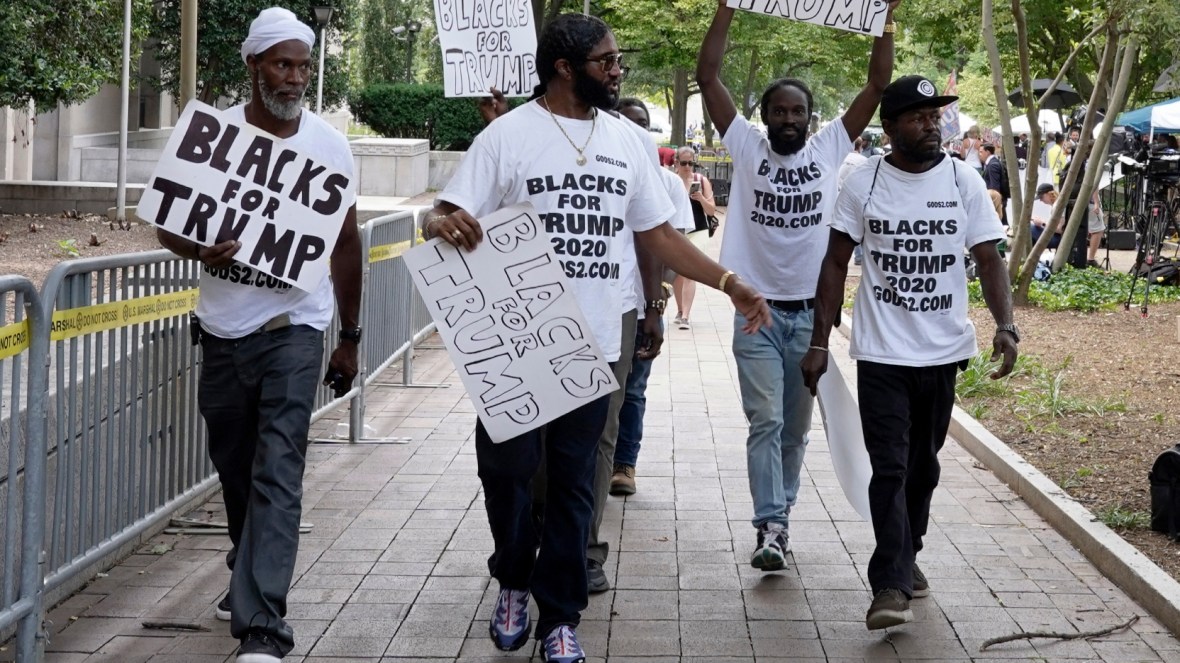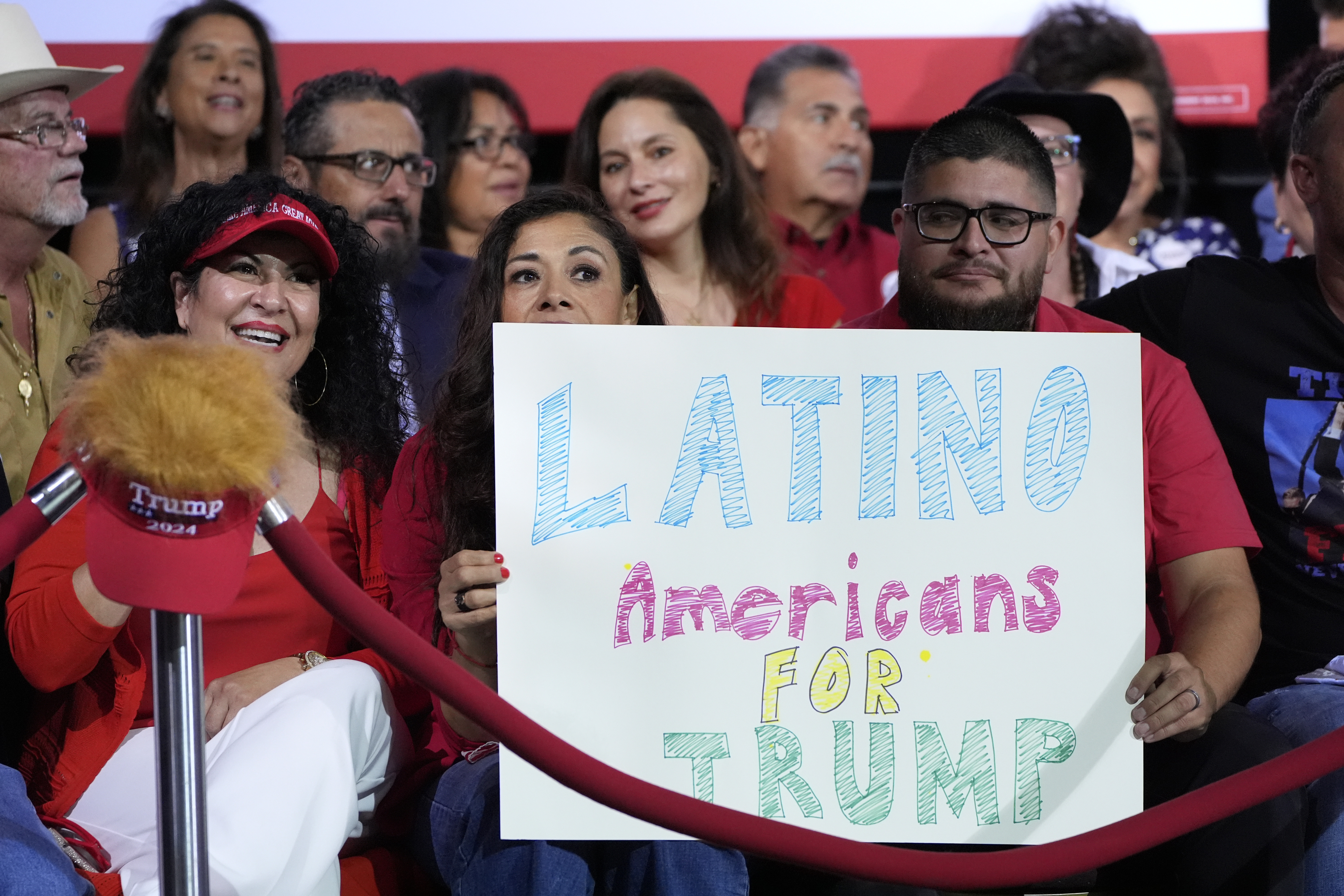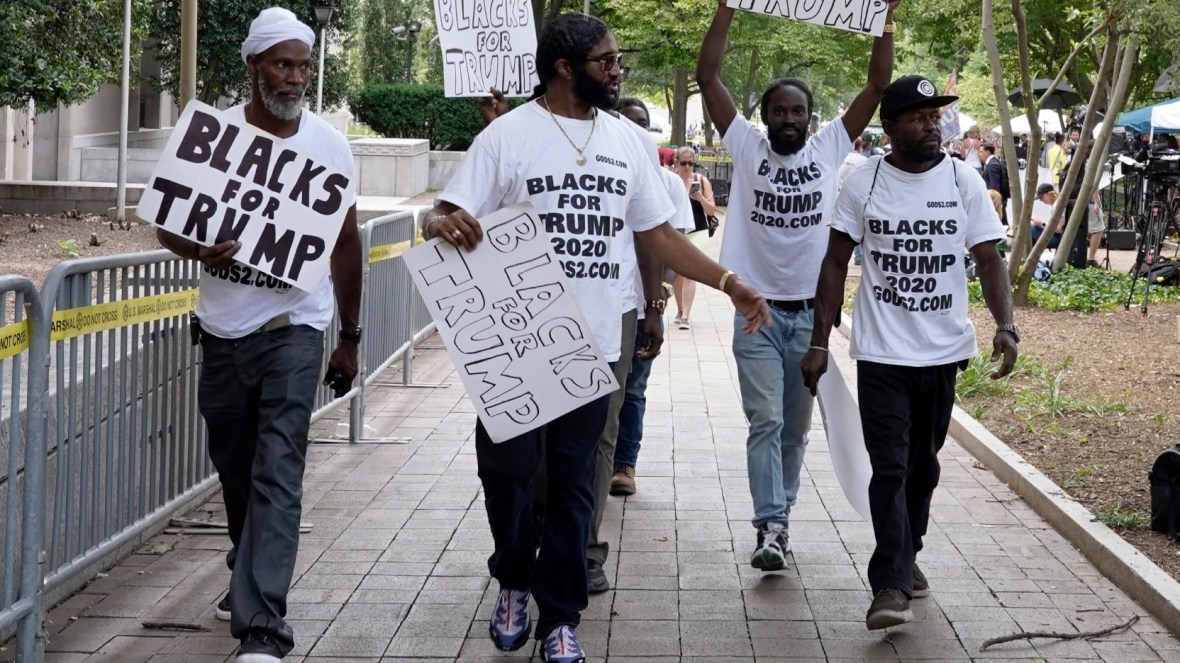Some young Black and Latino men say they chose Trump because of the economy and jobs. Here’s how and why

About 3 in 10 Black men under age 45 went for Trump, roughly double the share he got in 2020.
WASHINGTON (AP) — Brian Leija, a 31-year-old small-business owner from Belton, Texas, was not surprised that a growing number of Latino men of his generation voted for Donald Trump for president this year. Leija had voted for the Republican in 2016 and 2020.
Leija’s rationale was simple: He said he has benefited from Trump’s economic policies, especially tax cuts.
“I am a blue-collar worker,” Leija said. “So, tax breaks for small businesses are ideal for what I do.”
For DaSean Gallishaw, a consultant in Fairfax, Virginia, a vote for Trump was rooted in what he saw as Democrats’ rhetoric not matching their actions. “It’s been a very long time since the Democrats ever really kept their promises to what they’re going to do for the minority communities,” he said.
Gallishaw, 25, who is Black, also voted for Trump twice before. This year, he said, he thought the former president’s “minority community outreach really showed up.”
Trump gained a larger share of Black and Latino voters than he did in 2020, when he lost to Democrat Joe Biden, and most notably among men under age 45, according to AP VoteCast, a nationwide survey of more than 120,000 voters.
Even as Democrat Kamala Harris won majorities of Black and Latino voters, it wasn’t enough to give the vice president the White House, because of the gains Trump made.
Economy and jobs made men under age 45 more open to Trump
Voters overall cited the economy and jobs as the most important issue the country faced. That was true for Black and Hispanic voters as well.
About 3 in 10 Black men under age 45 went for Trump, roughly double the share he got in 2020. Young Latinos, particularly young Latino men, also were more open to Trump than in 2020. Roughly half of young Latino men voted for Harris, compared with about 6 in 10 who went for Biden.
Juan Proaño, CEO of LULAC, the nation’s largest and oldest civil rights organization for Hispanic Americans, said the election results make it clear that Trump’s messaging on the economy resonated with Latinos.
“I think it’s important to say that Latinos have a significant impact in deciding who the next president was going to be and reelected Donald Trump,” Proaño said. “(Latino) men certainly responded to the populist message of the president and focused primarily on economic issues, inflation, wages and even support of immigration reform.”
The Rev. Derrick Harkins, a minister who has served Abyssinian Baptist Church in New York, has overseen outreach to Black American religious communities for more than a decade. He said that Trump’s hypermasculine appeal worked to win over some younger men of color.
“I think that Trump with this bogus machismo has been effective amongst the young men, Black, white, Hispanic,” Harkins said. “And I think unfortunately, even if it’s a very small percentage, you know, when you’re talking about an election like we just had it can be very impactful.”

Black and Latino voters’ priorities changed from 2020
While about 4 in 10 young voters under 45 across racial and ethnic groups identified the economy as the top issue facing the country, older white and Latino voters were likely to also cite immigration, with about one-quarter of each saying that was the top issue.
A clear majority of young Black voters described the economy as “not so good” or “poor,” compared with about half of older Black voters. Majorities of Latino voters, regardless of age, said the economy is in bad shape.
That belief made it more difficult for Harris to highlight the actual numbers in the economy, which show that inflation has receded dramatically, unemployment remains low and wages have risen. These voters simply did not feel that progress.
This is the first time Alexis Uscanga, a 20-year-old college student from Brownville, Texas, voted in a presidential election. The economy and immigration are the issues that drove him to vote for Trump, he said.
“Everything just got a lot more expensive than it once was for me,” Uscanga said. “Gas, grocery shopping even as a college student, everything has gone up in price and that is a big concern for me and other issues like immigration.”
Having grown up selling tamales and used cars, and washing cars, Uscanga knows how hard it can be to make a living. When Trump was president, he said, it did not feel that way, he said.
“Under the Trump presidency more opportunities were abound,” Uscanga said. “I was not very fond of President Trump because of his rhetoric in 2016 but I look aside from that and how we were living in 2018, 2019, I just felt that we lived a good life no matter what the media was saying and that’s why I started supporting him after that.”
Though the shift of votes to Trump from Black and Latino men was impactful, Trump could not have won without the support of a majority of white voters.
“Men of color are really beginning to emerge as the new swing voters,” said Terrance Woodbury, co-founder of HIT Strategies, a polling and research firm that conducted studies for the Harris campaign.
“For a long time, we talked about suburban women and soccer moms who can swing the outcome of elections. Now men of color are really beginning to emerge as that, especially younger men of color, who are less ideological, less tied to a single party, and more likely to swing either between parties or in and out of the electorate,” Woodbury said.

Desire for strong leadership made Trump more appealing
A majority of voters nationally said Trump was a strong leader; slightly fewer than half said the same about Harris. Among Hispanic voters, even more saw Trump as strong in this election. Roughly 6 in 10 Hispanic men described Trump as a strong leader, compared with 43% who said that in 2020. About half of Hispanic women said Trump was a strong leader, up from 37%.
Black men and women were about twice as likely as in 2020 to describe Trump as a strong leader.
David Means, a purchasing manager in Atlanta who is Black, abstained from voting in the election because he did not feel either Harris or Trump was making the right appeals to Black men. But the results of the election did not disappoint him.
“I’m satisfied with the result. I don’t feel slighted. I wasn’t let down. I wasn’t pulling for Trump or Kamala, but I did not want a woman in that position,” he said. And if it were to be a woman, Means said, “I’d rather have a really strong and smart woman, for example, like Judge Judy.”
___
Figueroa reported from Austin, Texas. Associated Press writers Deepti Hajela in New York, Sharon Johnson in Atlanta and Darren Sands contributed to this report.

